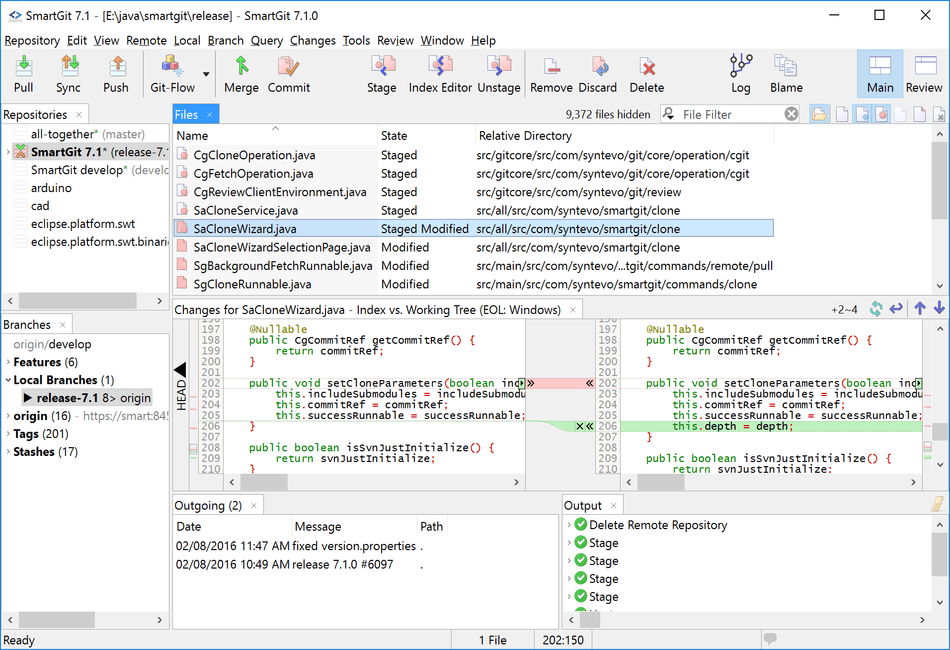

- #Git gui client osx multiple accounts for mac
- #Git gui client osx multiple accounts mac os
- #Git gui client osx multiple accounts Patch
- #Git gui client osx multiple accounts full
- #Git gui client osx multiple accounts code
SourceTree has a broader approval, being mentioned in 618 company stacks & 414 developers stacks compared to Gogs, which is listed in 9 company stacks and 10 developer stacks. Here's a link to Gogs's open source repository on GitHub.ĩGAG, Typeform, and Zillow are some of the popular companies that use SourceTree, whereas Gogs is used by Write.as, OSInet, and GameDuell. Gogs is an open source tool with 30.8K GitHub stars and 3.56K GitHub forks. "Self-hosted github like service" is the primary reason why developers consider Gogs over the competitors, whereas "Visual history and branch view" was stated as the key factor in picking SourceTree.
#Git gui client osx multiple accounts Patch

#Git gui client osx multiple accounts code
Gogs can be classified as a tool in the "Code Collaboration & Version Control" category, while SourceTree is grouped under "Source Code Management Desktop Apps". Manage all your repositories, hosted or local, through SourceTree's simple interface.
#Git gui client osx multiple accounts full
Use the full capability of Git and Mercurial in the SourceTree desktop app.
#Git gui client osx multiple accounts mac os
With Go, this can be done in independent binary distribution across ALL platforms that Go supports, including Linux, Mac OS X, and Windows SourceTree: A free Git GUI client for Windows and macOS. The goal of this project is to make the easiest, fastest and most painless way to set up a self-hosted Git service. Fork is getting better and better day after day and we are happy to share our results with you. Gogs: A self-hosted Git service written in Go. Then give your key a recognizable title and paste in your public ( id_rsa.pub) key:įinally, test your authentication with: ssh -T you've followed all of these steps correctly, you should see this message: Hi your_user_name! You've successfully authenticated, but GitHub does not provide shell access.Gogs vs SourceTree: What are the differences? Go to your GitHub settings page and click the "New SSH key" button: Or for Windows, simply run: clip < ~/.ssh/id_rsa.pub # Windows Add your public SSH key to GitHub Next, you need to copy your public SSH key to the clipboard.įor Linux or Mac, print the contents of your public key to the console with: cat ~/.ssh/id_rsa.pub # Linux Then, add your private key to ssh-agent with: ssh-add ~/.ssh/id_rsa Copy your public SSH key
#Git gui client osx multiple accounts for mac
For it to work properly, it needs to be running and have a copy of your private key.įirst, make sure that ssh-agent is running with: eval "$(ssh-agent -s)" # for Mac and Linux Ssh-agent is a program that starts when you log in and stores your private keys. You can read more about how SSH / RSA key pairs work here. It's extremely important that you never reveal your private key, and only use your public key for things like GitHub authentication. Note: SSH keys are always generated as a pair of public ( id_rsa.pub) and private ( id_rsa) keys. Then generate a new set of keys with: ssh-keygen -t rsa -b 4096 -C check that your keys exist with the ls -al ~/.ssh command and ensure that the output is similar to the one listed above. If you don't see any output or that directory doesn't exist (you get a No such file or directory message), then run: mkdir $HOME/.ssh If your keys already exist, skip ahead to the Copy your public SSH key section below. rw- 1 user_name user_name 12892 Feb 5 18:39 known_hosts

rw-r-r- 1 user_name user_name 414 id_rsa.pub If you've already generated SSH keys, you should see output similar to this: -rw- 1 user_name user_name 1766 id_rsa Open a terminal and enter the following command: ls -al ~/.ssh Check for an existing SSH keyįirst, check if you've already generated SSH keys for your machine. Here's a quick guide to generate and configure an SSH key with GitHub so you never have to authenticate the old fashioned way again. Just think–all of that time you spent entering your email address and password into the console every time you push a commit could have been spent coding. If you use GitHub without setting up an SSH key, you're really missing out.


 0 kommentar(er)
0 kommentar(er)
